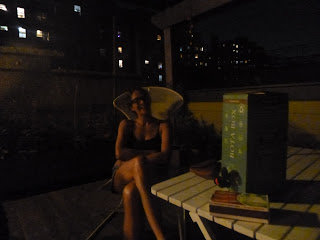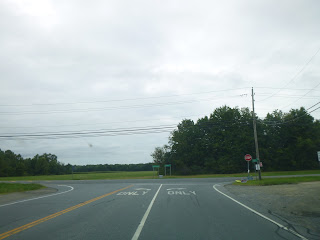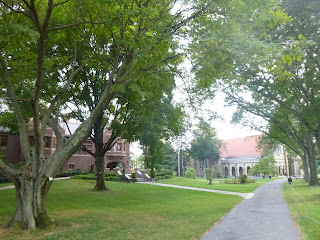
My old friend Rob was in town for a
few days. By way of England, he was supposed to be a visiting scholar at a
college in upstate New York, where I spent my Junior year. We’ve known each other for thirty years now,
living down the hall from each other Freshman year. When I applied to spend my
junior year on the east coast, he questioned the decision as he completed his study
abroad in England. Over the next few months, so we corresponded about the
choice.
Mary McCarthy wrote the Group about her experience there, I
noted in one letter.
“We are the hero of our own story,” penned McCarthy,
inspired by her experiences and friends at school. Fertile ground, countless stories have
grown from such a space. Certainly, my
novel does.
The conversation only continued
over the years between Rob and I.
We’d spend the week chatting, as
Rob adjusted to being back in the US.
“You always said if I teach here
that you’d give me one of your dad’s old pipes,” reminded Rob, who knew my dad,
talking with him for hours in Southern California. So we looked through the
pile and he grabbed one.
I showed him around to my favorite
places, Barbes for jazz in Park Slope, Coney Island for the Cyclones.
The pipe did not make it back from
Barbes. Lost to the world, yet again, but somehow set in motion instead of
sitting on that dusty shelf, perhaps someone else is smoking it now?
The next night, we met friends, and
talked about Moby Dick and Melville.
You shouldn’t write a novel if you
are not going to aspire for it to be that great, noted Caroline after we
enjoyed a low country broil chatting on the roof for hours.
Friday, we drove upstate to help
settle in for the teaching exchange.
Rob was going to stay in a rooming
house. Arriving it looked straight out Sophies Choice. You almost expected to
hear Nathan screaming at Sophie upstairs.
But this was a new story we were hatching.
Looking around the old campus, memories
meandered through my mind – the old attack room where I stayed, the library,
etc.
“This is the current moment,” he chided
me.
After lunch we walked to check out
the English Department at Swift Hall. Its
hard to walk here without thinking of the past, of the shows I’ve seen here,
the classes I took, of Pete Seeger playing here.
As Rob sat to talk with the
department chair, I looked at the books. A copy of Leon Edel’s The Modern Psychological Novel was sitting on the stacks. The chapter
on the autobiographical novel drew me in. All books tell us about the authors,
notes Virginia Wolf. That’s why I read
them. They tell us who the author is. That’s
what I’m trying to figure out.
I’m not sure about that theory,
noted Rob, stacking copies of his books for the semester on his fireplace. We don’t want everyone to become too myopic, too
stuck in themselves.
Its not my theory, its Edel’s I
replied. But all theory is all
autobiography.
I looked at Rob’s book. I have not
read that, I commented, pointing to
Brighton Rock, Graham Greene’s novel of about
Catholicism, published in 1938.
Bill Bryson says the road teaches us to appreciate what we
have. For him, that meant Graham Greene
novels and a day off the road.
Over the next day, the conversation meandered; we picked up
supplies for house, went out for dinner and to do some hiking across the Hudson.
It’s a three and a half mile from one bridge to the next and
back.
Fearful the wind would blow me off, the conversation back to
the questions about faith and writing.
Are any of our lives singular events or are more lives more
significant than others, wondered Rob? Or
is it more than an existentialist story we are living – rolling the rock up the
hill until we become part of the dirt once again? Or are there more significant stories?
Well, what of our story here in the USA, where my people came
generations ago, escaping persecution only to kill Indians and import slaves.
Well, like most of the problems in the word, you can blame
that one on the British, who created the intellectual justification for it,
noted Rob.
Manifest destiny and the white man’s burden.
Maybe its better that we don’t have larger narratives?
Individual stories of engagement may be more telling?
But some are more important than others, noted Rob. I just
want you to see that.
So is engagement, fighting supreme court judge appointments,
for a better climate, for a democracy and world.
But what about writing?
Can you write a story outside yourself, asked Rob, looking at me. Here is a challenge: if you write a story
based on nothing about yourself then I will write a story about myself and
we’ll see how they shake out.
I started to thinking about Damien, my favorite story by Herman Hesse. “I have
been and still am a seeker,” confessed the protagonist. ”… but I have ceased to
question stars and books; I have begun to listen to the teaching my blood
whispers to me.”
I start to imagine a man working in an old abbey and a
family comes from the USA. They have a long conversation about the road. The man in the abbey wonders what his life
would be life if he had chosen another path.
Remove yourself from the character
like Hesse does. Go against type counseled Rob.
Explore the parallel life.
I’d like to write about that boat
in the water, I told Caroline this summer, sitting in the Amalfi coast.
Tell me about the whole world in that boat sitting in the
water, Caroline replied.
You will find in the tidepools the whole universe, Rob followed,
paraphrasing Steinbeck and his friend Ricketts.
Over and over, we find ourselves talking about writing and
memories and experiences. Parents and brothers, Cain and Abel, literary
aspirations, vanities, and so on.
I
tell Rob a story about a hiking accident on Mt Hood three decades ago. Over a dozen people set out for a day hike to
the top. Ten of the hikers were high school students, another three adults. When
they did not return that night, people
started to worry. The slow melt down began as they wondered what was happening. It was snowing too much to go back. The hikers found their way to a cave. The next day, two of the hikers appeared at a
lodge after going to get help.
Desperate, they told the story of the hikers getting snowed in. 11 more were stuck inside the cave, waiting
for help. The
blizzard continued all day long. By the
third day, a search party found three more people dead outside the caves. One
had ripped off her boots, another with no parka. They had lost their minds, hypothermia
robbing their senses. Delusional, they
thought they were hot. Eventually, a searcher found the cave. The hikers inside were frozen. An intravenous link could not break their
skin. Two of the climbers survived. The rest
would have to live with the guilt of not taking part, of wondering what their
last days were like, the parents becoming cold and detached and their friends wondering
why they were spared, slowly losing themselves over the years to come.
“I
think we all died a bit that day,” noted one of the survivors.
Finishing storytelling, we made our way back to the car we’d
left behind to begin the hike.
But where is our car?
Zigging and zagging we walk below the bridge we’d just traversed
across the Hudson.
We’re officially inside a Kafka story looking for car.
“This is the dumbest question you have probably ever heard, but
we lost our car,” Rob told the parks and rec folks.”
“We’re looking for the beginning of the hike?” I chimed in.
“Not close to the dumbest,” they reply. “It begins up there,”
they continue, pointing up.
We make our way.
The evening of stories continues, with more questions about
faith and the nature of narrative.
On my way home, I found myself thinking about Rob’s challenge
and a moment at Villamayor
de Monjardin on the Camino a few years ago. Maybe there is a story there, in a
few of those moments walking and wondering?
At the time, I wrote about walking through a field:
And then there was a
road trip to Kansas City when I turned on a tape recorder and narrated?
So many ways of recalling.
Story to be continued.



































































































































































No comments:
Post a Comment